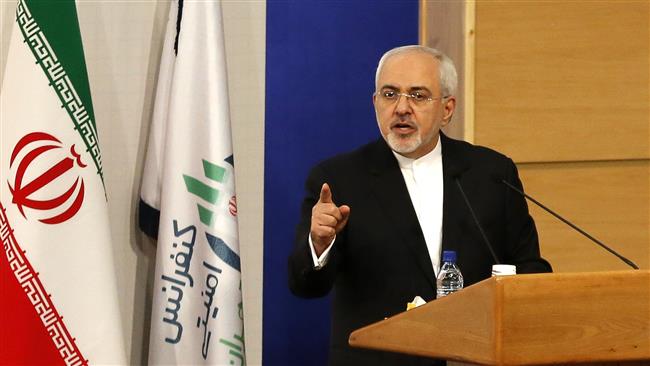US reliance on nuclear arms violates Non-Proliferation Treaty: Zarif
Iranian Foreign Minister Mohammad Javad Zarif says Washington's reliance on nuclear arms violates the Non-Proliferation Treaty (NPT).
"The US Nuclear Posture Review reflects greater reliance on nukes in violation of the #NPT, bringing humankind closer to annihilation. No wonder the Doomsday Clock is at its most dangerous since 1953. Trump’s obduracy in killing the #JCPOA stems from the same dangerous imprudence," Zarif tweeted on Saturday.
The US Nuclear Posture Review reflects greater reliance on nukes in violation of the #NPT, bringing humankind closer to annihilation. No wonder the Doomsday Clock is at its most dangerous since 1953. Trump’s obduracy in killing the #JCPOA stems from the same dangerous imprudence.
— Javad Zarif (@JZarif) February 3, 2018
In 1970, the Treaty on the Non-Proliferation of Nuclear Weapons, or NPT, was ratified, and it was extended indefinitely in 1995. Under the treaty, the five permanent members of the United Nations Security Council — China, France, Russia, the United States and the United Kingdom — were acknowledged as nuclear powers, and other countries that joined the treaty agreed not to pursue nuclear weapons development, although they are allowed to use nuclear technology for non-military purposes.
On Friday, Washington unveiled its Nuclear Posture Review (NPR), a new nuclear arms policy that purportedly aims to revamp the US nuclear arsenal and develop new low-yield atomic weapons.
The policy effectively ends efforts under the administration of former President Barack Obama to reduce the size and scope of the US arsenal and minimize the role of nuclear weapons in defense planning, outlining the Pentagon's nuclear ambitions under President Donald Trump.
Read More:
- Moscow denounces ‘anti-Russian’ nature of new US nuclear policy
- Deadly weapons dealers in no position to comment on Iran defense power: Qassemi
- Trump's new nuclear strategy draws blistering criticism from arms control experts
On January 12, Trump extended waivers of economic sanctions on Iran for another 120 days but said he was doing so “for the last time.”
Although the US president declined to withdraw from the Iran deal — which he has long railed against and formerly promised to “rip up” — he gave a four-month deadline to the US Congress and America’s main European allies to address what he called the “disastrous flaws” of the deal.
The agreement, reached between Iran and the P5+1 countries -- the US, the UK, France, China, Russia and Germany -- puts limitations on parts of Iran’s nuclear program in exchange for removing all nuclear-related sanctions. A decision to reimpose sanctions would have effectively ended the nuclear agreement.
‘All wars have rules. All of those rules have been broken’ by Israel
VIDEO | Report flags India’s violation of rights of Rohingya detainees
Turkey's foreign minister meets Syria's de facto leader in Damascus
'Next to impossible' to rescue patients from Gaza's Kamal Adwan Hospital: Director
VIDEO | Vietnam current prosperity
Report blames gasoil exports for shortage at Iranian power plants
VIDEO | Hind Rajab Foundation names Israeli war criminals vacationing after Gaza genocide
VIDEO | Australians rally for Gaza ahead of Christmas festivities















 This makes it easy to access the Press TV website
This makes it easy to access the Press TV website